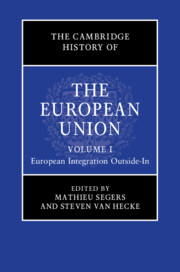Book contents
- The Cambridge History of the European Union
- The Cambridge History of the European Union
- The Cambridge History of the European Union
- Copyright page
- Contents
- Figures
- Contributors to Volume I
- Acknowledgements
- Abbreviations
- Reflections on the History and Historiography of European Integration
- Part I Critical Junctures
- 1 The Emergence of a Divided World and a Divisible West
- 2 European Integration and the Temporary Division of Germany
- 3 Europe, Decolonisation and the Challenge of Developing Countries
- 4 European Integration and Globalisation since the 1970s
- 5 A Europe of Reunification?
- 6 Moderately Failing Forward: The EU in the Years 2004–2019
- Part II Multilateralism and Geopolitics
- Part III Perspectives and Ideas
- Index
- References
6 - Moderately Failing Forward: The EU in the Years 2004–2019
from Part I - Critical Junctures
Published online by Cambridge University Press: 21 October 2023
- The Cambridge History of the European Union
- The Cambridge History of the European Union
- The Cambridge History of the European Union
- Copyright page
- Contents
- Figures
- Contributors to Volume I
- Acknowledgements
- Abbreviations
- Reflections on the History and Historiography of European Integration
- Part I Critical Junctures
- 1 The Emergence of a Divided World and a Divisible West
- 2 European Integration and the Temporary Division of Germany
- 3 Europe, Decolonisation and the Challenge of Developing Countries
- 4 European Integration and Globalisation since the 1970s
- 5 A Europe of Reunification?
- 6 Moderately Failing Forward: The EU in the Years 2004–2019
- Part II Multilateralism and Geopolitics
- Part III Perspectives and Ideas
- Index
- References
Summary
In the history of European integration, the years after 2004 have been characterised by three main processes: the dialectic of deepening and broadening, the unfolding and impact of major crises, and new types and levels of European politicisation. This chapter aims to develop a perspective on how these three contemporary historical processes relate to the longer-term process of European integration. I claim that the enlarged European Union (EU) of the early twenty-first century may have been moderately failing forward when managing its numerous crises, but it has been able neither to substantially counter the fallout from repeated crises, nor to meaningfully reverse internal processes of socio-economic and increasingly also political divergence. In global comparison, the failings of the EU have clearly been relative rather than catastrophic. At the same time, the steps the EU has taken in these years – to counter crises, integrate and democratise – would need to be assessed as rather moderate precisely because internal challenges have been mounting amidst a worsening external environment.
- Type
- Chapter
- Information
- The Cambridge History of the European Union , pp. 163 - 186Publisher: Cambridge University PressPrint publication year: 2023

